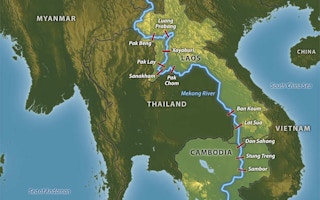In the wake of the Laos government’s decision this week to proceed with the Don Sahong dam on the Mekong River mainstream, bypassing the Mekong River Commission (MRC) process for consultation, WWF calls on Lower Mekong ministers to hold an emergency meeting.
“The MRC was effectively broken in November last year when Laos decided unilaterally to proceed with the controversial Xayaburi dam, against the express wishes of Vietnam and Cambodia,” said WWF International Director General Jim Leape. “It is impossible to imagine that the Mekong River can be harnessed sustainably without the MRC functioning properly, ensuring joint decisions are reached on dam developments that are to the benefit of all.
“The four Lower Mekong countries must immediately revisit the spirit of the original MRC agreement and meet urgently to resolve their differences and fix the consultation process before any other dam projects are considered. If the countries fail to get serious about their obligation to cooperate, they risk sabotaging both the MRC and management of one of the world’s great rivers.”
On the 30 September 2013, the Laos government notified the MRC – an inter-governmental agency made up of representatives from the four Lower Mekong countries – of its decision to proceed with the development of the Don Sahong hydropower project in the Siphandone area of southern Laos. The Don Sahong dam will block the only channel available for dry-season fish migrations on the Mekong River, putting the world’s largest inland fishery at risk.
The project’s construction is expected to start next month and be finished by February 2018. Under the MRC agreement, all dams on the mainstream of the Mekong, which include the Don Sahong and Xayaburi dams, should go through the MRC’s consultation process. This process allows for a minimum 6-month consultation with other countries to review the development projects with an aim to reach consensus on whether they should proceed.
“The Mekong is a shared river, and the four countries are bound by the MRC agreement to hold inter-governmental consultations before proceeding with dam developments that impact their neighbours,” said Leape. “Vietnam, Cambodia and Thailand need to voice their concerns now about Laos’ continued failures to honour the consultation agreement. Without effective transboundary cooperation, the livelihoods and food security of 60 million people are in jeopardy.”
Environment and water ministers from the four Lower Mekong countries had agreed in 2011 to delay a decision on building the US$3.5 billion Xayaburi dam pending further studies on its environmental impacts. Nonetheless, the Laos government decided to forge ahead with construction without consensus among its neighbours or notifying the MRC.
Vietnam has also previously requested that no further developments on the Mekong mainstream occur until the Mekong mainstream dams study, agreed upon by the MRC in 2011, is completed.
“The Xayaburi dam is a dangerous experiment,” said WWF’s Dr. Jian-hua Meng, WWF’s Sustainable Hydropower Specialist. “The risk to fisheries, fish migration and impacts from sediment effects are immense, and the consequences for downstream countries dire. There are 11 dams planned on the lower mainstream of the Mekong, and the region can’t afford to get a single one wrong.
“There are locations on the Mekong that are suitable for genuinely sustainable hydropower, but the Lower Mekong countries must urgently get the MRC back on track to broker those negotiations and fill the major science and data gaps, or risk building dams by guesswork.”
WWF advises Lower Mekong countries considering hydropower projects to prioritise dams on some Mekong tributaries that are easier to assess and are considered to have a much lower impact and risk.
Emergency meeting of the Mekong River Commission urgently needed – WWF

Most popular
-
![Food_Waste_Market_India]()
Opinion / Food & Agriculture
India’s food waste is turning into an environmental time bomb
India’s colossal food waste problem is both a symptom and a significant accelerator of the climate crisis. -
![solar panels my]() Google will also buy renewable energy for its Malaysian data centres from another solar project in the northern …
Google will also buy renewable energy for its Malaysian data centres from another solar project in the northern … -
![Arthur Joseph Kurup]()
News / Policy & Finance
Arthur Joseph Kurup appointed as Malaysia’s new environment minister
He takes the helm of the Natural Resources and Environmental Sustainability ministry following a Cabinet reshuffle, succeeding acting … -
![A city view of Singapore]()
News / Carbon & Climate
Singapore dominates Southeast Asia’s green startup landscape, report finds
New mapping of climate firms shows region rich in solutions but constrained by grids, finance and coordination. -
![Sustainable innovations of 2025]()
News / Policy & Finance
14 sustainable innovations that gave us hope in 2025
From carbon-lite AI to recycled human hair, Eco-Business sifts through the technologies that tackled environmental and social problems … -
![Climate_Inequality_Crosswalk_India]()
Opinion / Policy & Finance
India’s climate diplomacy must account for domestic inequalities
Economic liberalisation in India has shifted the emissions burden from more equal and developed states to less equal …







